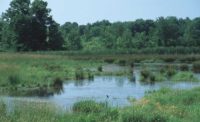The US Army Corps of Engineers and US Environmental Protection Agency (EPA) will rewrite, yet again, the “Waters of the United States” rule. This comes after a review ordered by President Biden found that the law, revised under the Trump administration, has resulted in fewer bodies of water being protected.
The rule was originally written under the Obama administration to better clarify which bodies of water should be protected under the U.S. Clean Water Act. Under Waters of the U.S., or WOTUS, seasonal water bodies and ephemeral streams could be classified as needing federal protection. Contractor groups were opposed to WOTUS because having more water bodies under federal jurisdiction could impact construction.
The Trump revision, which did not include those types of water bodies, resulted in a 25-percentage point reduction in the waters that were protected, said Acting Assistant Secretary of the Army for Civil Works Jaime A. Pinkham in a June 9 announcement about the revision.
“The lack of protections is particularly significant in arid states, like New Mexico and Arizona, where nearly every one of over 1,500 streams assessed has been found to be non-jurisdictional,” according to the announcement. “The agencies are also aware of 333 projects that would have required Section 404 permitting prior to the Navigable Waters Protection Rule, but no longer do.”
The US Department of Justice will file a motion requesting remand of the Trump era rule as the Corps and EPA begin the new rule-making process.
The administration seems clear in its notice that the Biden rule won’t simply use WOTUS as written by the Obama administration, says Larry Liebesman, senior advisor at Dawson & Associates.
“Ultimately, any rule will have to stand a reasonable chance of being upheld by the Supreme Court,” he says. “With a conservative majority, any final rule that looks too much like the 2015 Obama rule will have a hard time being upheld.”
Liebesman added that the rule-making will be complex and take a long time.
EPA and the Corps said that the effort to rewrite the rule will consider the impact of climate change on the nation’s water, emphasize a “practical implementation approach” and will reflect input from landowners.





Post a comment to this article
Report Abusive Comment